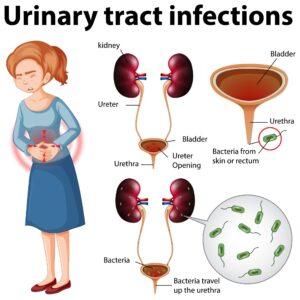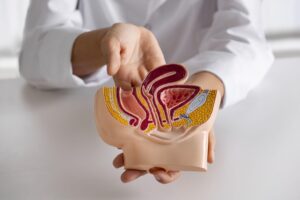Last updated on September 26th, 2024 at 11:15 am
Urinary tract infection treatment typically involves a combination of antibiotics and lifestyle adjustments to alleviate symptoms, clear the infection, and prevent recurrence. Urinary tract infections (UTIs) are commonly caused by bacteria, most often Escherichia coli (E. coli), entering the urinary tract.
Timely treatment is essential to prevent the infection from spreading to the kidneys, which can lead to more severe complications.
Urinary Tract Infection Symptoms
Urinary tract infection symptoms typically include a frequent, urgent need to urinate, accompanied by a burning sensation during urination. Children may exhibit fever, irritability, or unexplained bedwetting. The urine may appear cloudy, bloody, or strong-smelling.
UTIs can cause lower abdominal discomfort and even pain in the lower back or sides, indicating a potential kidney infection. Early diagnosis and treatment with antibiotics are essential for managing UTIs effectively.
Urinary Tract Infection Treatment
Here is an overview of the UTI treatment process:
- Antibiotics:
The cornerstone of urinary tract infection treatment is antibiotics. Your healthcare provider will prescribe antibiotics based on the type of bacteria causing the infection and its sensitivity to specific antibiotics. Commonly prescribed antibiotics for UTI treatment include trimethoprim-sulfamethoxazole (Bactrim), nitrofurantoin (Macrobid), ciprofloxacin (Cipro), and fosfomycin (Monurol).
It is critical to complete the full course of antibiotics, even if you start feeling better before ending the medication. This guarantees the complete elimination of all the bacteria responsible for the infection. Failure to complete the antibiotics could lead to a recurrence of the infection and potential antibiotic resistance.
- Pain Relief:
UTIs can be accompanied by uncomfortable symptoms such as a burning sensation during urination and lower abdominal pain. Over-the-counter pain relievers like ibuprofen (Advil) or acetaminophen (Tylenol) can help alleviate these discomforts. Please seek advice from your healthcare professional before initiating any medication.
> Consult a doctor and Order Medicine Online
- Increased Fluid Intake:
Drinking plenty of water is essential when treating a UTI. It helps flush out the bacteria from the urinary tract and dilutes urine, making it less irritating to the bladder. Aim to drink at least eight 8-ounce glasses of water per day, and consider incorporating cranberry juice or unsweetened cranberry supplements, which may help prevent UTIs.
- Urinary Alkalinizers (Optional):
In some cases, your healthcare provider may recommend urinary alkalinizers to help alleviate the burning sensation during urination. These drugs function by decreasing the acidity of urine. However, they are not typically required for all UTI cases and should only be used under medical guidance.

Home Remedies for UTI Treatment
UTI home treatment can provide relief from the symptoms and support your recovery, especially when the infection is mild. However, it’s important to note that home remedies should not replace professional medical treatment when the infection is severe or persists. Here are some home treatment strategies for UTIs:
- Hydration: Drinking plenty of water is one of the most important home remedies for UTIs. Water helps flush out bacteria from the urinary tract and dilutes urine, reducing irritation. Strive to consume a minimum of eight 8-ounce glasses of water each day.
- Cranberry Juice: Some studies suggest that cranberry juice or cranberry supplements may help prevent UTIs and reduce their severity. Cranberries contain compounds that can inhibit bacteria from sticking to the urinary tract lining. Opt for unsweetened cranberry juice or capsules.
- Heat Therapy: Applying a warm heating pad to your lower abdomen can provide comfort and help relieve pain associated with UTIs. Assure the heat is not too hot to avoid skin burns.
- Avoid Irritants: Steer clear of irritants that can exacerbate UTI symptoms. This includes alcohol, caffeine, spicy foods, and acidic or carbonated beverages, which can irritate the bladder.
- Proper Hygiene: Maintain good hygiene by practising proper wiping techniques (front to back) after using the restroom. This helps prevent the spread of bacteria from the rectum to the urinary tract.
- Urinate Regularly: Don’t hold in your urine for extended periods. Frequent urination helps flush out bacteria and prevent their growth in the urinary tract.
- D-Mannose: Some people find relief from UTI symptoms by taking D-mannose supplements. D-mannose is a type of sugar that can prevent certain bacteria from adhering to the urinary tract lining. It’s advisable to consult with a healthcare professional before using this supplement.

UTI in Children Treatment
The treatment of urinary tract infections (UTIs) in children is crucial to alleviate symptoms and prevent complications. It primarily involves antibiotics prescribed by a pediatrician, tailored to the specific bacteria causing the infection.
It is essential to complete the entire antibiotic course, even if symptoms improve, to ensure complete eradication of the infection and prevent antibiotic resistance. Alongside medication, encouraging the child to stay hydrated helps flush out bacteria and reduce discomfort.
Pain relievers may be recommended to manage symptoms like fever and pain during urination. In cases of recurrent UTIs or underlying factors, further evaluation and preventive measures may be necessary for the child’s well-being.
Conclusion:
If you experience recurrent UTIs or have additional risk factors, such as kidney stones or anatomical abnormalities, your healthcare provider may conduct further tests and recommend specialized treatment or preventive measures tailored to your situation. Always consult with a healthcare professional for proper diagnosis and treatment of urinary tract infections.
Read: What are Generic Medicines?
Difference Between Patent And Generic Medicine
Patent medicines are innovative drugs developed by pharmaceutical companies and protected by patents, granting exclusive rights for a set period. Generic medicines, on the other hand, are identical copies of these patented drugs.
They contain the same active ingredients but are typically available at a lower cost once the patent expires. Generic drugs are subject to strict quality and safety standards, providing a more affordable alternative for consumers while maintaining the same therapeutic effects.
FAQs On Urinary Tract Infection Treatment
Q1. What is urinary tract infection treatment?
Urinary tract infection (UTI) treatment typically involves a course of antibiotics prescribed by a healthcare provider to eradicate the infection. Adequate hydration and pain relievers may be used to alleviate symptoms. Completing the full antibiotic course is essential to prevent recurrence and complications.
Q2. How long does it take for antibiotics to work in UTI treatment?
Antibiotics for UTIs often start providing relief within 1-2 days, but it’s crucial to complete the full prescribed course (usually 3-7 days) to ensure the infection is fully cleared.
Q3. Can I treat a UTI with home remedies instead of antibiotics?
While home remedies like drinking water and cranberry juice can offer symptom relief, antibiotics are essential to effectively treat the infection and prevent complications.
Related Links:
-
- Skin Whitening Treatment
- Parkinson’s Disease Treatment
- Low BP Treatment
- Hypothyroidism Treatment
- Hypertension Treatment
- Hair Loss Treatment for Male and Female
- Erectile Dysfunction Treatment
- Balanitis Treatment
- Typhoid Fever Treatment
- Sinusitis Treatment
- Acne Treatment
- Rheumatoid Arthritis Treatment
